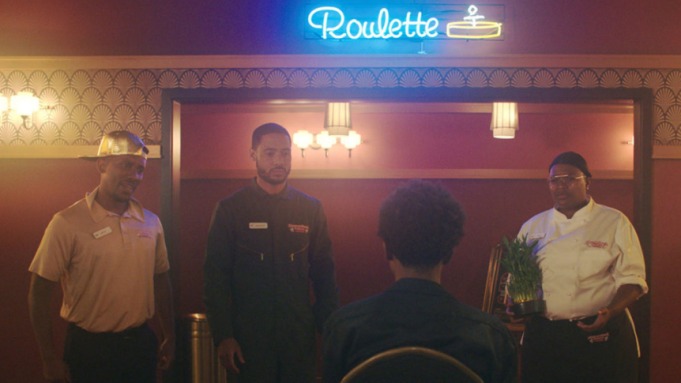Bust Down is unafraid of sparked debate. The Peacock series addresses delicate subjects like workplace harassment, homelessness, and colorism over the course of six episodes. Four friends who work at a casino in Gary, Indiana who are the film’s protagonists conduct labour protests and freely discuss how they feel like every decision they make must be, as one character puts it, “the choice of a Black person.”
However, the purpose of Bust Down is not to present unpleasant truths or provide life lessons. People aren’t being lectured for not caring enough or made fun of for caring too much. In the midst of all these unsolvable problems, it is here to have fun. Any humour must do a delicate balancing act to maintain its edge without becoming arrogant or sour. But because of the main cast’s unbridled sense of humour and their outrageous chemistry, Bust Down succeeds at pulling it off far more frequently than not.
With a first episode that fords treacherous ground, the series establishes its irreverent tone right away. Manager Dan Bakkedahl gropes stockroom worker Jak (Jak Knight), prompting radically divergent reactions from his buddies. Sam (Sam Jay), the only woman in the group who has experienced plenty of professional harassment, pushes Jak to drown his sorrows in alcohol. Langston (Langston Kerman), the ambitious one of the group, presses Jak to report the event in order to acquire leverage for promotions.
Jak’s ordeal, meanwhile, sends Chris (Chris Redd) into a tailspin as he realises a youthful encounter with an older woman was abuse, even though he insists that “you’re not molested unless you feel molested” now. This is shown via a purposefully clunky flashback in which characters brightly announce things like “we’re in 1997.”
Jak treats his pain like a zombie bite after taking entirely too much solace in Langston’s advice that “hurt people hurt people,” and Chris makes a laughably ineffective PSA to inform his coworkers about “male molestation.” The episode addresses some extremely important and real issues, but it doesn’t dig very deeply into the topic of sexual assault or offer any profound insights, let alone offer any practical remedies.
But that’s essentially the concept. Sam dismisses DomiNque Perry’s criticism of him, saying, “Everything doesn’t need to be unpacked.” She goes on to say that Sam hasn’t so much “boxed up his trauma and poured Hennessy on top of it” as “helped Jak process” his trauma. That can serve as the central idea of Bust Down. It may poke fun at serious issues, but it’s really just a lighthearted comedy meant to be laughed at simply because it’s entertaining to see these friends talk about whose celebrity’s crap they’d eat if they had to. Lisa Bonet’s would “come out clean, like a cup of soft serve,” in Sam’s opinion. For example, when Langston envisions Sam, Nina, and Sam’s sidekick Tiki (Phi Tran) rearing a child together in the manner of a corny multi-cam sitcom. Or when Jak creeps through sperm bank vents as a voiceover monologue from Watchmen plays.
In contrast to how its characters act, Bust Down often tempers its characters’ most outrageous assertions with comments from supporting characters who will point out how absurd they are acting. However, as with any show that enjoys pushing buttons, different viewers will have different opinions about how far is too far — whether the show makes too much of the violence Sam endures at the hands of an enraged Tiki, for instance, or whether the cartoonish nature of the altercation and Sam’s apparent indifference are sufficient to lessen the impact of the situation. As with any show that relies so heavily on silliness, some jokes just work better than others; perhaps other people will laugh more heartily than I did at tales of Sam arguing with talking hamburger patties at a backyard barbecue or Chris establishing a one-man VIP area.
The show also frequently sends its characters off alone; for example, episode five sends the gang to church before splitting them off into four distinct narratives that only occasionally cross paths. While each of the actors is capable of carrying plots on their own, when they work together, their unpretentious but adoring chemistry tends to make them funnier. Each spectator will undoubtedly find some of the four different energies funnier than others since they interact with each other in such a unique way. I could handle Chris’ excessive weirdness better in moderation, but I couldn’t get enough of Jak’s troublemaking space cadet.
Even so, the comic voice of the series is delightfully audacious, and if one joke leaves you unimpressed, three more usually follow immediately. There are times when they get abrasive, nonchalantly criticising Barack Obama for not doing enough for Black people or the guys in the Black Lives Matter movement for “retweeting, basically” while women took the lead. But most of the time, the jokes in Bust Down centre on the buddies themselves, as when Chris says that the only way to profit from social justice work is to ensure that nothing actually changes, even as he engages in a foolish scheme to do so.
Bust Down is not implying that none of this is important; rather, it is recognising that much of it is important and opting to respond by having fun. The series’ important themes—such as racism and poverty—aren’t going away any time soon, and its characters aren’t allowed to completely ignore them. These issues might be addressed in a totally different presentation with stern exhortations to action or sombre analyses of possible solutions. But Bust Down’s persistent silliness also has a refreshing and relatable quality, serving as a reminder that despite how terrible the world can be, there will always be space for hanging out with your pals and having a good time.

